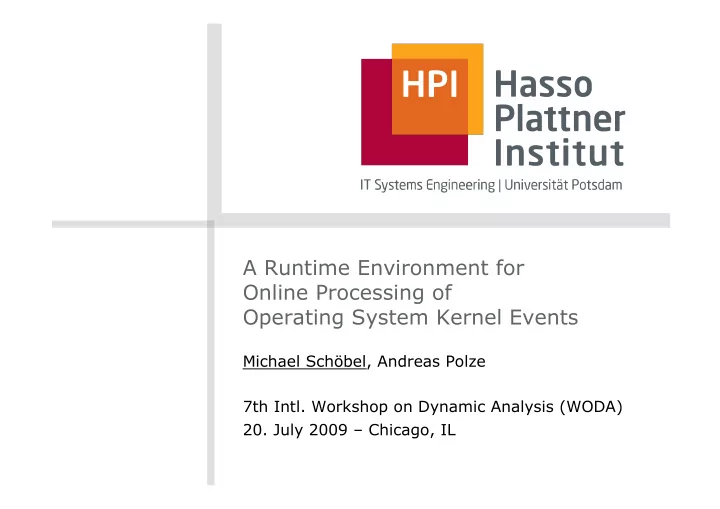

A Runtime Environment for Online Processing of Operating System Kernel Events Michael Schöbel, Andreas Polze 7th Intl. Workshop on Dynamic Analysis (WODA) 20. July 2009 – Chicago, IL
OS Kernel Event Tracing 2 ■ Dynamic Analysis ■ Usage scenarios □ System analysis □ Debugging □ Runtime-state monitoring ■ Problem identification □ Search “bad” patterns in the event stream □ Adapt the system as reaction to “bad” pattern
Advantages of event tracing 3 ■ Detailed information ■ Hints for solution might be available in trace ■ ... under the assumption that □ Meaningful set of events is monitored □ System is usable with activated tracing
Limiting aspects 4 ■ Problem identification □ Experienced administrators □ Pattern description ■ Huge logfiles □ Detailed event information requires space □ Online processing of events ■ Offline/Post-Mortem analysis model □ Activate tracing – deactivate – (reboot?) – analysis □ Execute callbacks / scripts when a pattern is detected
Agenda 5 ■ Pattern description ■ Online processing of events ■ Execute callbacks / scripts when a pattern is detected
Pattern specification 6 ■ Similar to regular expressions □ Sequence [a, b, c] □ Alternative (a | b | c) □ Negation ~a □ Simple events event:name □ Arrays of events event[>4]:name □ Conditions WHERE □ Timeframe WITHIN □ Result data RETURN
Example 7 Import Event Types Rule Name EVENTS “wmkevents.h” Event Pattern RULE nosyscallexit PATTERN { [syscall:a, ~(syscallexit|threadtermination), syscall] } WHERE { [ProcessId], Conditions [ThreadId], a.SyscallNr < 300 } RETURN { a.SyscallNr, Return Values a.TimeStamp }
Join fields in WHERE statement 8 ■ Abbreviated form ... PATTERN { [syscall:a, ~(syscallexit|threadtermination), syscall] } WHERE { [ProcessId], [ThreadId] } ■ ... instead of PATTERN { [syscall:a, ~(syscallexit:b|threadtermination:c), syscall:d] } WHERE { a.ProcessId == b.ProcessId, a.ProcessId == c.ProcessId, a.ProcessId == d.ProcessId, a.ThreadId == b.ThreadId, a.ThreadId == c.ThreadId, a.ThreadId == d.ThreadId }
Compiler 9 ■ Based on C++ version of Coco/R □ Parse event description and pattern definition □ Generate … ◊ Deterministic Finite Automata (DFA) for pattern ◊ Graphical (.dot) representation of DFA (for debugging) ◊ DLL for console printing of rule results ■ Features □ Check WHERE conditions as early as possible □ Save only the required parts of the event information □ Compact binary representation of DFA
Deterministic Finite Automata 10
Agenda 11 ■ Pattern description ■ Online processing of events ■ Execute callbacks / scripts when a pattern is detected
Instrumentation framework 12 ■ Windows Monitoring Kernel □ Static instrumentation □ Based on Windows Research Kernel ◊ Custom build Windows Server 2003 kernel □ Usage similar to KLogger for Linux □ Overhead ~ 1% for 13k events per second □ Compiler parses C header file wmkevents.h ◊ Get available event types ◊ Read event type descriptions
DFA processing model 13 ■ Runtime state (RTS) information □ Representation for single automata run □ Data structure is generated by compiler ◊ Current state ◊ Event field information ◊ Result information □ Evaluate conditions for current state □ Determine valid transition □ Conditions evaluated based on event data and RTS □ Actions copy event data to RTS
Current implementation 14 ■ User-mode application □ Load rule representation □ Read event stream from WMK logfile □ Output: ◊ Result information match #1 { 106 485370171 } ◊ Processing statistics match #2 { 139 1320873480 } match #3 { 139 1350760491 } match #4 { 139 1351041183 }
Agenda 15 ■ Pattern description ■ Online processing of events ■ Execute callbacks / scripts when a pattern is detected
React to detected patterns 16 ■ Application domain □ Reconfiguration ◊ Caching policy ◊ Number of worker threads □ Callback to application specific function ■ System domain □ Reconfiguration ◊ Prevent execution of malware pattern ◊ Adapt thread/process priorities □ Execute script in kernel mode
Execute application specific callback 17 ■ Programming interface for applications □ Control rule lifecycle (load-activate-deactivate-unload) □ Callback ◊ Registered for a specific rule ◊ Implements reaction to detected pattern ◊ Access to rule results ( RETURN values) ◊ Access to execution context information □ Synchronous or asynchronous processing in user mode
Kernel mode scripting 18 ■ Extend rule specification language □ Allow script definition: DO keyword ◊ Access to (named) events and event data fields ◊ Access to execution context information ◊ Runtime environment exposes some kernel functions □ Execute reactions directly in the kernel
Outlook 19 ■ Kernel integration of runtime environment □ Efficient synchronization □ Condition evaluation / transition search ■ Case studies □ Server applications – worker thread management □ Deadlock detection / prevention □ Context-oriented programming
Summary 20 ■ Pattern description □ Regular expressions □ Compiled to Deterministic Finite Automata ■ Online processing of events □ No logfile required ■ Execute callbacks / scripts when a pattern is detected □ OS kernel integrated runtime environment
Recommend
More recommend